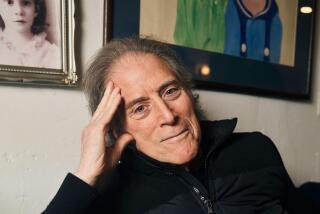Harold Ramis: 7 life lessons from a comic genius
The news that Harold Ramis died Monday at the age of 69 sent many of us scrambling for our web browsers, briefly keeping sadness at bay by remembering a filmmaker, writer and actor who made us laugh -- and then laugh again and again.
What we found was not just insight into the mind of a comic genius, but also Ramis’ quest to better know himself, and the world, through life, movies and his immersion in Zen Buddhism.
Here are a few of the interesting tidbits we learned about Ramis:
OBITUARY: Harold Ramis: 1944-2014
1) He stayed true to his roots. Ramis was one of Chicago’s most famous and most faithful residents. In late 1996, he and his family picked up moved back to Chi-Town, in part because he wanted to be known “as a local” and because L.A. was too much like high school, he said, causing one to fret, “Am I cool? Am I popular?”
It wasn’t all that unusual to see Ramis at a Cubs game, and on occasion he would lead the 7th-inning stretch and a round of “Take Me Out to the Ball Game.”
2) He wasted nothing. He got his start as a joke writer for Playboy. (Sounds like a guy’s dream job, right? But Ramis has been quoted as saying, “I never read Playboy before I started working there and stopped reading it the day I quit.”) He also caddied at a country club and worked in a psychiatric ward, all jobs that he used to hone his comic vision.
PHOTOS: Actor and director Harold Ramis through the years
3) Ramis famously co-starred with Bill Murray in “Ghostbusters,” but the pair had a falling out on the set of “Groundhog Day,” which Ramis directed and Murray starred in. The pair never spoke again, Ramis said in 2009, but he did not seem to hold a grudge.
4) Speaking of “Groundhog Day,” Ramis got a kick out of the fact that the story of a cynical reporter forced to relive the same day over and over was embraced by so many different religions, all claiming it represented “their” point of view. “ At first I would get mail saying, ‘Oh, you must be a Christian, because the movie so beautifully expresses Christian belief... Then rabbis started calling from all over, saying they were preaching the film as their next sermon. And the Buddhists!”
Ramis told NPR’s Terry Gross in 2005, “There is no universal meaning to life that applies now and for always, for each and every person. Our job — and it’s a tough job — is to figure out what it all means and to fulfill a personal destiny that we each figure out for ourselves.”
PHOTOS: The films of Harold Ramis
5) Like many of us, Ramis was forced to confront his limitations. He wrote the script for “Animal House” and wanted to direct it but was too green: “The first comedy screenplay that I wrote was ‘Animal House,’ and I always thought I could and should be a director, but no one was about to give me that opportunity on ‘Animal House.’ ”
6) Ramis is the textbook example of a guy who recognizes his weakness and then decides to capitalize on his strength. He wanted to be a comedy star -- the performer, the guy in the spotlight. But he quickly realized that wasn’t going to happen.
“The moment I knew I wouldn’t be any huge comedy star was when I got on stage with John Belushi for the first time,” he said. Belushi’s comic genius was simply overpowering. But it was still a teaching moment for Ramis: “I learned that my thing was lobbing in great lines here and there, which would score big and keep me there on the stage.”
7) Ramis is well represented on the American Film Institute’s “The 100 Funniest American Movies of All Time,” giving us “Ghostbusters,” “Groundhog Day” and “National Lampoon’s Animal House.”
ALSO:
Proof that pop music is all about one thing: Sex
The Force is not with you: Fitbit’s fitness tracker recalled
Now you can shower with your smartphone (You know you want to)
More to Read
Sign up for Essential California
The most important California stories and recommendations in your inbox every morning.
You may occasionally receive promotional content from the Los Angeles Times.










